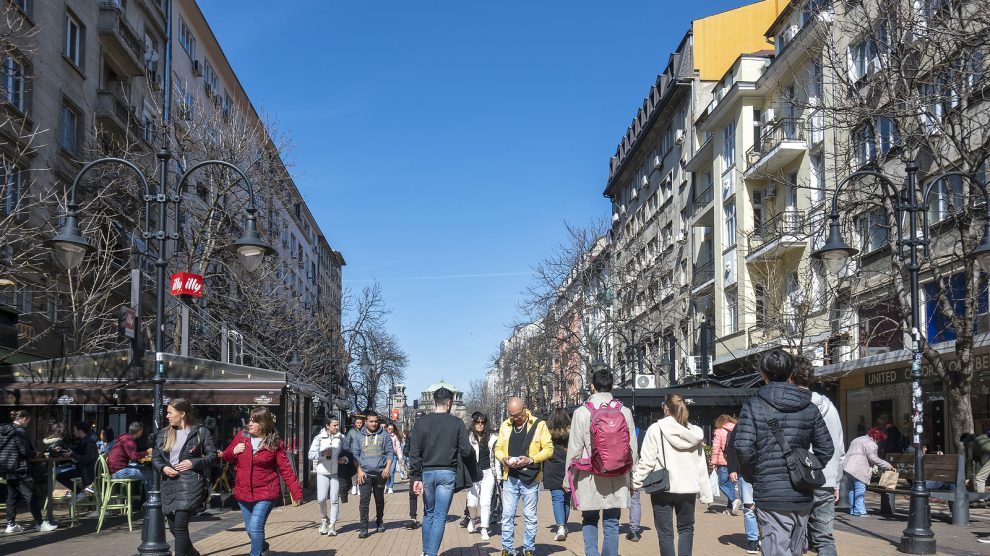In the second of a series of articles discussing an important weekend of elections for the emerging Europe region, Dimitar Keranov looks at Bulgaria, where the European Parliament vote played second fiddle to yet another inconclusive national election.
The centre-right Citizens for European Development of Bulgaria – Union of Democratic Forces (GERB-SDS) of former prime minister Boyko Borissov won Bulgaria’s June 9 parliamentary elections, garnering 24.08 per cent of the votes.
Тhis was an election with the lowest voter turnout ever, of just 33.4 per cent, signalling a disappointment in Bulgarian democracy by the voters. GERB-SDS was followed by the centrist Movement for Rights and Freedoms (DPS) with almost 15.85 per cent, while the reformist We Continue the Change–Democratic Bulgaria (PP-DB) came third with 14.99 per cent. The radical right pro-Russian Revival (Vazrazhdane) party took fourth with 14.26 per cent of the votes.
Three other parties passed the four pre cent threshold to be represented in parliament: the Bulgarian Socialist party (BSP; 6.93 per cent), the populist There is Such a People (ITN; 6.21 per cent), and the emerging nationalist pro-Russian party Greatness (Velichie), which got 4.91 per cent. Establishing a government majority requires 121 deputies out of the total of 240, so now the negotiations phase can begin.
With the exception of PP-DB, all of these parties represent the old status quo, seen as being responsible for Bulgaria’s continued unwillingness to combat corruption and thus Russian influence, which are interconnected. This has effectively led to Bulgaria’s democracy being unconsolidated, and the country being only nominally pro-Western orientated, oftentimes favouring Russian interests. The biggest democratic backsliding occurred under Boyko Borissov’s GERB rule between 2009 and 2020.
The EU elections, held simultaneously with the parliamentary ones, also concluded in a GERB-SDS victory with 23.18 per cent, with the old status quo and pro-Russian parties thus being able to send the majority of the 17 Bulgarian representatives to Brussels—14. PP-DB will only be sending three. In the Bulgarian context however, the EU elections hold a secondary significance, and the aftermath of the parliamentary elections has more serious political implications for Bulgarian democracy.
Relative stability, and sabotage
PP-DB emerged after 2020 as the only alternative to the status quo parties when GERB lost its grip on power amidst nationwide protests in 2020. A political crisis of five parliamentary elections ensued that was only ended when PP-DB and GERB-SDS entered a power-sharing agreement despite their differences in May 2023 that brought a degree of political stability. It was planned that Nikolay Denkov of the PP-DB would be prime minister for nine months, and that Mariya Gabriel of GERB-SDS would take over in March 2024.
This was the only time in recent years when Bulgaria managed to adopt an active pro-Western stance, effectively combat Russian cultural, economic and political influence and advance judicial and anti-corruption reforms, thanks to PP-DB’s initiative. This progress was however only possible with the support of DPS, whose leader Delyan Peevski is sanctioned by the United States of America under the Global Magnitsky Act.
This period of stability allowed GERB-SDS and DPS to repair their tarnished image and subsequently collapse the government by sabotaging the planned rotation in March 2024, fearing continued reforms driven by PP-DB would certainly endanger their positions and even lead to prosecution. This led to the parliamentary elections being held together with the European elections on June 9.
Possible scenarios
Now following the elections, GERB-SDS can form a nominally pro-Western government with DPS and ITN, or any other old status quo party. They can also rely on additional support from the rest of the old status quo and pro-Russian parties—BSP, Revival and Velichie, as to completely sideline PP-DB and deprive them of any political power.
This would make it possible to block further anti-corruption and judicial reforms, prevent reforms in the largely pro-Russian security services, effectuating a more favourable policy towards Russia, and ultimately capture all state institutions by deploying own cadres at all levels, as done in the past during Borissov’s tenure.
Another scenario, that is also favourable to the old status quo, is to continue holding successive parliamentary elections, because the cadre pool of the interim governments is close to the old status quo. This would effectively mean that GERB-SDS and the old status quo would still run the government unofficially.
Whichever of the two scenarios occur, Bulgaria, which is a key EU and NATO member in the Black Sea region, is headed for a new political crisis, with the only reformist power PP-DB successfully isolated by the old status quo.
This crisis is coupled with imminent democratic backsliding, destabilisation, blocking of reforms, and halting of efforts to combat Russian influence. This ultimately signifies a dangerous rapprochement with Moscow and will cast doubts on Bulgaria’s standing as a trusted partner internationally. Sofia’s allies in Brussels and Washington should be concerned by these developments.
Unlike many news and information platforms, Emerging Europe is free to read, and always will be. There is no paywall here. We are independent, not affiliated with nor representing any political party or business organisation. We want the very best for emerging Europe, nothing more, nothing less. Your support will help us continue to spread the word about this amazing region.
You can contribute here. Thank you.


